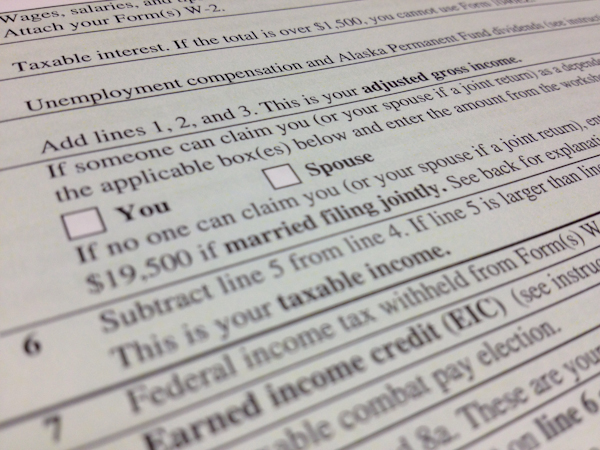Photo by: Nick Conley
With the tax-filing season now officially open, some students may find themselves unable to file for their tax return.
The Internal Revenue Service announced last week that they will not process tax returns for certain higher education tax credits until the middle of February.
Those using Form 8863 for higher education credits to claim the American Opportunity Tax Credit and the Lifetime Learning Credit will be delayed, which means their tax return check will also be delayed.
Lawrence Pitts, a senior accounting major, said this delay is going to hurt him as well as several other students.
“It’s really kind of a bummer,” Pitts said. “We have spring break coming up.”
Many students depend on their tax return check for their added expenses of the season.
“I’m trying to get out of here, so I can go have some fun,” Pitts said. “And now, I’ll barely have my tax return back in time to even get a plane ticket or anything like that.”
Junior Sarah Wheat said she would definitely feel the delay’s wrath.
“I was pretty disappointed,” Wheat said of finding out about the delay. “I don’t have a job right now, so I depend on that money. I have to find a way to make money before then.”
Due to late tax legislation on the passage of the American Taxpayer Relief Act on Jan. 1, the start of the filing season was delayed, which in turn delayed a number of tax forms, including Form 8863.
Elaine Kelly, an associate professor of accounting, said the delay gives the IRS time to adjust.
“The IRS tested the form and found processing errors and program mistakes,” Kelly said. “I’m not surprised if other forms get delayed for a variety of reasons.”
According to an IRS statement, “the IRS reviews and tests its systems in advance of the opening of the tax season to protect taxpayers from processing errors and refund delays.”
The statement went to on to say the delay will have no impact on taxpayers claiming other education-related tax benefits, such as the tuition, fees and student loan interest deductions. It said about 3 million tax returns include Form 8863, which is less than a quarter of those filed during the year.
Kelly said about 80 to 90 percent of the Oklahoma Christian University campus would be affected by the delay. Many students who are dependent on their parents may receive the credit without realizing.
More students need to know their tax information, Pitts said.
“I don’t know if everybody knows about it,” Pitts said of the delay. “If they go pay somebody to do their taxes, hopefully they would tell them about it. Some people just don’t know about it.”
Pitts said some people might not realize the delay until it’s too late.
“It will create more problems because they won’t know why their tax return is taking a month or more to get back to them,” Pitts said of the delay. “It’s really just going to cause a lot of problems all around.”
Wheat said a lot of students have very limited knowledge on taxes.
“Students could definitely use more education,” Wheat said of tax information. “My parents usually did my taxes for me, and then when I had to do my own taxes I didn’t know where to start.”
Many students will have to be more aware of their spending.
“You’ll need to plan your budget a little bit better this month,” Pitts said. “Just be prepared to maybe not go out and have as much fun this time until you get it back.”
Controlling your own taxes goes a long way to holding a budget.
“It’s easy to go out and spend money,” Wheat said. “I’m not the best at keeping a budget.”
Other students will be in a similar situation, she said.
“This will definitely affect other students as it will affect me,” Wheat said. “Some students won’t care.”
With the passage of the American Taxpayer Relief Act, the American Opportunity Education Tax Credit, which is a $2,500 tax credit for tuition costs for four years of post-high school education, was extended through 2017.
The Higher Education Tuition Deduction, which allows people to deduct between $2,000 and $4,000 of qualified tuition costs, was extended through 2013.















Be First to Comment